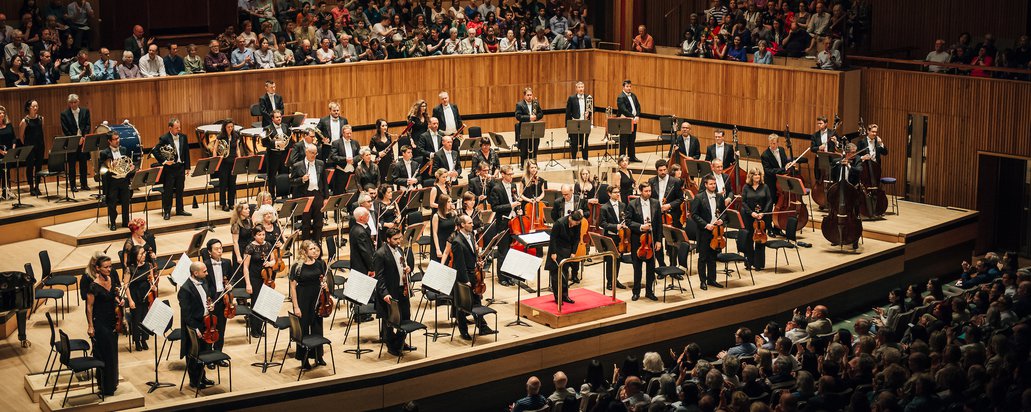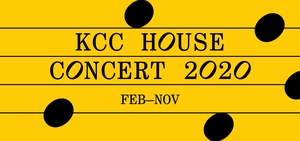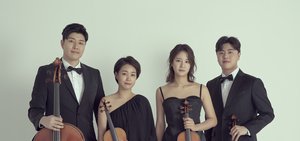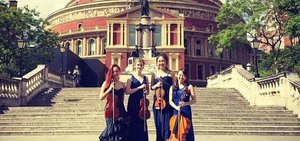The Stars of K-Classical Music

KCCUK Culture Series
In this week’s instalment in the KCCUK Culture Series we will be focusing on the slightly lesser-explored category of Korean classical music.
Korea is home to the third largest music market in Asia and has gained widespread international attention for its rich history of traditional music as well as the now ubiquitous genre of K-Pop. However, in this week’s instalment in the KCCUK Culture Series we will be focusing on the slightly lesser-explored category of Korean classical music.
For a number of years the KCCUK has introduced UK audiences to Korean classical music through our regular KCC House Concert programme. Although our live music events are currently suspended due to Covid-19, our new KCC Home Theatre Series presents a handpicked selection of online concerts, uploaded to our YouTube channel every Thursday and featuring a wide range of classical music performances, among other genres.
The history of classical music in Korea
The opening of Korean ports in 1876 (the late Joseon Dynasty) brought the first major introduction of Western culture into the peninsula, including Western classical music. The history of the early introduction of Western musical styles was one of instruction and performance in vocal and instrumental music by foreigners. Representative examples are the hymns taught by Christian missionaries and the Western ensemble established by Germany’s Franz Eckert (1852–1916).
In 1910, Korea became a colony of Japan following an invasion and the signing of the Japan-Korea Annexation Treaty. The following years saw an influx of Japanese military songs composed in the Western style, as well as Koreans studying classical music in Japan. Western music was also taught in Western-style educational institutions which would become more active after the end of the colonial period. Orchestras began to be formed around 1926, with specialised ensembles like the Central Friends of Music Society (Jungang Aguhoe, 1926) and the Joseon Symphony Orchestra (1940) spearheading the development of musical culture. The emergence of such professional musicians as Baek Wooyong, Kim In-sik, Lee Sang-jun, Jeong Sa-in, and Hong Nan-pa ushered in a new era in the history of Western music in Korea.
Following liberation from Japan in 1945, many musicians disappeared or died during the Korean War of 1950-53. From the mid-1950s onwards efforts were made to re-establish the musical ensembles and actively incorporate world-class compositions through exchanges with the West. The predecessor of today’s Seoul Philharmonic Orchestra was the Navy Information and Education Band, which was established in 1951 during the Korean War. The Army Orchestra that had been formed in 1950 was likewise relaunched after the war in 1956 as the KBS Symphony Orchestra.
Opportunities for Koreans to study classical music in the West became more and more frequent. Musicians who made their debut on the international stage in the 1960s included pianist Han Tong-il along with violinists Chung Kyung-wha and Kim Young-uck. The decade of the 1970s saw more and more musicians arriving on the world music scene as they claimed honours at international competitions.
The Korea of today is no longer an importer of classical music, but a leading music nation producing a wide array of performers who have gone on to play leading roles in the world music scene. And the country has now established an educational system and facilities to bolster this, along with a wide range of performance venues and music enthusiasts.
Leading the K-Classical Wave
Before the turn of the twenty-first century, Korean classical musicians rarely made it into the final rounds of auditions for international competitions – by 2007 they accounted for 25% of all prize winners, and this figure is growing.
The World Federation of International Music Competitions (WFIMC), which represents 122 leading classical music contests across 40 countries, celebrated its 60th anniversary in 2017. It revealed that in the space of 60 years Korean musicians took home awards in over 150 international competitions, especially in the categories of piano, vocals, violin and cello.
There are three names that spring to mind as the original masters of Korean classical music, whose successful legacies have helped other Korean musicians get where they are today: they are conductor Chung Myung-whun, pianist Paik Kun-Woo and soprano Sumi Jo.
Chung Myung-whun has used his experience with the world’s top orchestras to lift the Seoul Philharmonic Orchestra to an international standard. After moving to the US as a young boy and performing as a pianist with the Seattle Symphony, Chung’s first big break came at the age of 21, when he placed second in the 1974 Tchaikovsky Competition, an achievement widely celebrated in Korea. He majored in conducting at the Julliard School of Music and has held several renowned international positions including Music Director of the Paris Opera (1989-1994) and the Asia Philharmonic Orchestra (since 1997), as well as Special Artistic Advisor and later Honorary Music Director of the Tokyo Philharmonic Orchestra (since 2001). Chung became Principal Conductor of the Seoul Philharmonic Orchestra in 2005, and in 2011 it became the first Asian orchestra to sign a major-label record deal with Deutsche Grammophon (Universal Music). Chung led the orchestra in its first performance at the BBC Proms in August 2014.
Pianist Paik Kun-Woo is famous for an expansive performing career, primarily on the stages of Europe, which has seen him offering unique interpretations of works by many different composers. He also studied at Juilliard and won the Ferruccio Busoni International Piano Competition in 1969. In his late twenties he moved to Paris, continuing to develop a vast repertoire that spans from Bach to Stockhausen, Busoni to Scriabin, and Liszt to Messiaen. In 2011, Paik decided to return to his Korean roots, giving performances to locals in various small island villages across the country who had few opportunities to hear live performances of classical music. When asked if the works of Debussy or Lizst would be inaccessible to first-time listeners, he said: “The biggest issue for a performer is whether they can win the audience over with their music. My belief is that when a performer properly interprets and performs the music, then everyone can understand it.”
Soprano Sumi Jo, praised by Herbert von Karajan for her divine voice, has dazzled audiences at an international level. She showed great talent at a young age, learning vocals, dancing, piano, and the gayageum, a traditional Korean 12-string zither. Jo studied at the Seoul National University College of Music before departing in 1983 for Italy and winning a series of international competitions in Naples, Barcelona and Pretoria among others. 1988, the year of the Seoul Olympics, was a crucial turning point in Jo’s career as she was invited to audition with the legendary Austrian conductor Herbert von Karajan and make her debut in Salzburg, playing the part of Oscar in Verdi’s Un Ballo in Maschera. Since then she has continued to shine on the world’s concert and opera stages while maintaining a prolific recording career. Among Jo’s many achievements is becoming the first Korean to receive an Oscar nomination for her performance of Simple Song Number Three from the film Youth, nominated in the Best Original Song category in 2016.
The international success of Korean pianists
The lineage of internationally renowned Korean classical pianists goes back to Han Tong-il, who made his mark with Korea’s first ever victory in an international competition – New York’s Leventritt Competition, in 1965. The outstanding young pianists who followed his legacy have become a solid underpinning for the current Korean classical music community – here are just a handful of names that come to mind.
The Pianist Brothers: Lim Dong-min and Lim Dong-hyek
Separated in age by four years, the Lim brothers made names for themselves by placing first and second, respectively, at the 1996 Chopin Competition for Children and Young People. They studied at the Moscow P.I. Tchaikovsky Conservatory under
Lev Naumov before entering Hannover National Music University. Dong-min placed third at the 2001 Busoni Competition and fifth at the 2005 Tchaikovsky Competition before returning to Korea, where he has since been active as a performer and educator. Dong-hyek placed second at the 2000 Hamamatsu International Piano Competition and first at the 2001 Long-Thibaud Competition. For his 2011 EMI debut, featuring performances of Chopin’s “Scherzo No. 2” and “Ballade No. 1,” he was honoured with a Diapason d’Or.
Son Yeol-eum started playing piano at three and a half years old at a small piano school in her hometown of Wonju, Gangwon-do Province. She made her recital debut in 1998 and began to attract worldwide interest after taking second place as the youngest contestant in the 1997 International Tchaikovsky Competition for Young Musicians. After Lorin Maazel (1930-2014) heard her perform Franz Liszt’s “Faust Waltz”, he invited her to perform with the New York Philharmonic. Son regularly performs in London; she has made appearances at the BBC Proms, and recently performed with the Aurora Orchestra at Kings Place.
Kim Sun-wook rose to international recognition after winning the prestigious Leeds International Piano Competition in 2006. He was both the first Asian and the youngest pianist ever to win the competition, at the age of 18. In 2008 he signed with music management agency Askonas Holt and moved to London, completing his MA in conducting at the Royal Academy of Music in 2013. Kim maintains a balance of intellect and emotion and has shown great prowess in playing Beethoven. In between touring the international circuit he has played at a handful of KCCUK events including the Korea/UK 2017-18 Season Closing Concert at the Southbank Centre.
At age 21, Cho Seong-jin turned heads by becoming the first Korean performer to win the International Fryderyk Chopin Piano Competition in 2015. Later that year, Cho performed Chopin’s Piano Concerto No. 1 as a soloist for Vladimir Ashkenazy’s Philharmonia Orchestra in London. The Financial Times wrote, “His sound was lucid and shimmering…Everything was well judged.” Cho signed an exclusive contract with Deutsche Grammophon, and his first three albums won impressive critical acclaim worldwide. His most recent recording, The Wanderer, was released in May 2020 and features Schubert's Wanderer Fantasy and Liszt's Piano Sonata in B minor. Cho has also made two successful appearances at the BBC Proms in 2018 and 2019.
First prize winner of both the Geneva International Music Competition (2014) and the Busoni International Piano Competition (2015), rising star Jiyeong Mun is often compared to Martha Argerich and is in great demand internationally both as soloist and in recital. She performs widely in Korea, Europe and the USA, including a performance at London’s Wigmore Hall in October 2019.
Sohn Jeung-beum became the first Korean to win first prize in the piano category at the ARD International Music Competition in Munich in 2017. The same year Minsoo Hong, whose performance was featured in our KCC Home Theatre Series programme on 30 April, won second prize at the Liszt International Competition in Utrecht. There are numerous other young Korean pianists that could be mentioned here, and the KCCUK is excited to continue supporting these rising stars through our classical-music focused programmes.
…and some more K-Classical stars to watch out for
Composers
As in many countries, in Korea modern music composition is seen as the least popular and most academic of subjects within the field of classical music. Yet Korea’s composers have had a momentous impact on the success of Korean classical music worldwide. The progenitor of modern Korean music is undoubtedly Isang Yun (1917-1995), who spent much of his career in West Germany and developed a strong reputation as a composer of avant-garde music.
Representing a second generation of prominent Korean composers, Unsuk Chin graduated from the Seoul National University College of Music where she received the Gaudeamus Award while still in her twenties. While living in Germany, she penned her masterpiece Acrostic Wordplay in 1991. Chin returned to Korea in 2005 to work as a resident composer with the Tongyeong International Music Festival in honour of Isang Yun. In 2007 her new opera Alice in Wonderland was invited for a performance at the Bavarian State Opera in Munich. From 2006-2017 she worked as a composer with the Seoul Philharmonic Orchestra under conductor Chung Myung-whun. Since 2011, she has overseen the London-based Philharmonia Orchestra’s Music of Today series.
Read the Southbank Centre's introduction to Unsuk Chin's career and exclusive interview from 2018.
Conductors
Following the legacy of Chung Myung-whun, a number of Korean conductors have also made a name for themselves on the world stage. Sung Shi-yeon began her career as a pianist and changed track in her twenties; she gained global recognition after winning the Sir Georg Solti International Conductors’ Competition in 2006 and placing second at the International Gustav Mahler Conducting Competition in 2007. That year she became the first female assistant conductor of the Boston Symphony Orchestra. From 2009-2013 she was the associate conductor of the Seoul Philharmonic, and she now serves as the artistic director and chief conductor of Gyeonggi Philharmonic Orchestra.
Voice
Soprano Sunyoung Seo was awarded first prize at the International Tchaikovsky Competition in 2011 for her performance of the Letter Scene from Tchaikovsky’s Eugene Onegin. While studying singing at the Korea National University of Arts in Seoul, Seo performed her first operatic role as Adina in Donizetti’s L’Elisir d’Amore. More recently she attracted rave reviews for her starring role as the slave girl Lui in Toscanini’s unfinished opera Turandot (staged by Opera North at the Leeds Town Hall in 2017), which was given five stars by The Telegraph.
Bass Jongmin Park also studied at the Korea National University of Arts and was awarded first prize (male singer) at the International Tchaikovsky Competition, as well as the Birgit Nilsson Wagner award at Operalia, in 2011. In 2014 he debuted at the Royal Opera House as Colline in La bohème and appeared at the BBC Proms and the City of London Festival.
Violin
One of the earliest Korean violinists to grace the world stage, Chung Kyung-hwa made a name for herself by winning the Leventritt Competition in 1967. In 1970, she made her European debut performing with the London Symphony Orchestra. She became the second ever Korean professor at the Juilliard School of Music in 2007. Her most recent return to live performance was in London at the Royal Festival Hall in 2014.
Violinist Sarah Chang began her studies of the violin at the age of four and an audition at the age of eight led to a spontaneous invitation from conductors Zubin Mehta and Riccardo Muti for her to play with the New York Philharmonic and Philadelphia Orchestra. She recorded her first album (released by EMI in 1992) when she was ten years old, setting a world record as the youngest recording artist. Chang enjoyed one of the greatest honours a performer can receive by winning the Avery Fisher Prize in 1999. She has been incredibly active since then as a recording artist, global performer and supporter of childhood musical education.
The first Korean violinist to win the Queen Elisabeth Competition in 2015, Lim Ji-young boasts such extraordinary technique and finesse that she is known in Korea as the “Swordswoman.” A graduate of the Korean National University of Arts, she is currently studying at the Kronberg Academy in Germany and has performed with orchestras all around the world.
Violinist Hyeyoon Park was the youngest ever winner of the ARD International Music Competition in Munich in 2009, at 17 years old. She also received the Borletti-Buitoni Trust and London Music Masters awards in 2011 and 2012 respectively. Park made her orchestral debut at the age of nine with the Seoul Philharmonic and has since achieved international acclaim with the London Philharmonic Orchestra, the NHK Symphony Orchestra and the BBC National Orchestra of Wales – to name a few. A keen chamber musician, she has appeared at music festivals around the world, including the Marlboro Festival at the invitation of Mitsuko Uchida.
Cello
Korea’s leading cellist is arguably Chang Han-na, who stunned the music world at the age of eleven by claiming the top prize and modern music award at the Rostropovich International Cello Competition. She would go on to perform under some of the world’s greatest conductors and made her own debut as a conductor at the Seongnam International Youth Orchestra Festival in 2007.
Viola
Richard Yongjae O’Neill is well known as the leader of now-disbanded Ensemble DITTO (2007-2019) and as a viola soloist. O’Neill has built a diverse career history for himself, working not only with such famous performers as Gil Shaham, Joshua Bell, and Chung Kyung-wha but also the Emerson and Juilliard String Quartets. As a soloist, he has played with the London Philharmonic under Vladimir Jurowski as well as the Los Angeles Philharmonic under Miguel Harth-Bedoya.
Quartet
Founded in 2007, the Novus String Quartet was awarded second prize at the ARD International Music Competition in Munich in 2012, and in 2013 made its debut at Carnegie Hall, New York. As the winner of the International Mozart Competition in 2014, the ensemble embarked on an extensive European tour, organised by Impresariat Simmenauer. The Quartet will come to London in December 2020 for its second concert at Wigmore Hall.
Orchestras and major music venues in Korea
Since their beginnings with the Central Friends of Music Society (Jungang Aguhoe) in 1926, Korean orchestras have been a major force in alerting the world to the potential of Korean classical music. Prominent among them are the Seoul Philharmonic Orchestra (established in 1948), the KBS Symphony Orchestra (1956), the Korean Symphony Orchestra (1985), and the Gangnam Symphony Orchestra (1997). Also significant are the numerous orchestras representing Korea’s different provinces and cities such as Busan, Gwangju, Daegu and Jeju Island. Each has been working to expand the base for classical music with a robust range of musical activities.
Major classical music venues
Korea’s largest multipurpose cultural space, the Seoul Arts Centre was built between the years of 1982 and 1993 and is located on the foothills of Mt. Umyeon in Seoul’s Seocho neighbourhood. Its performance venues include a Music Hall and Opera House, the former home to a Concert Hall exclusively for classical music. the Centre has undertaken bold attempts at breaking down musical boundaries between Seoul and the rest of Korea, most notably with its Orchestra Festival, which has been held every year since 1989.
The Sejong Centre for the Performing Arts was opened for use as a cultural space for citizens of Seoul. The Centre had predecessors in Unam Hall, which opened in 1961, and the Civil Hall, which was destroyed in a 1972 fire. It opened in its current location in 1968, drawing global attention as the largest performance venue in East Asia. Some of the world’s most notable orchestras have come to deliver performances at the Centre, and it has contributed to the popularisation of the Korean performing arts with various activities including “Sharing the Culture Together,” a free performance for underprivileged groups, and “Happiness for 1000 Won,” which offers visitors the opportunity to enjoy culture for less than a dollar in admission.
The first venue of its kind built in Seoul in 25 years, the Lotte Concert Hall opened to the public in late 2015 and is a full-sized, classical performance venue seating more than 2,000 people located on the roof of the Lotte World Mall.
Korean classical music at the KCCUK
Since 2016 our House Concert series has introduced some of the finest musicians from the Royal College of Music, the Guildhall School of Music & Drama, and the Royal Academy of Music through free and inclusive monthly concerts at the KCCUK. Audiences have enjoyed a wide-ranging programme of ensemble performances that shine a spotlight on the wealth of young musical talent that is being developed in London.
As a more lockdown-friendly alternative to this programme, we have recently introduced the KCC Home Theatre Series where we’ll be uploading performances of various genres to our YouTube channel for you to enjoy at home.
The current line-up features a series of concerts from prominent classical music events in Korea including The Passionate Keyboard and the Sejong Chamber Series 2019. We will shortly be introducing other genres including contemporary dance as well as traditional Korean music performances from the National Gugak Centre and elsewhere.
Performances will be uploaded every Thursday at 7pm and will be available to watch for a limited time – so make sure you don’t miss out.
Top image: Korea/UK 2017-18 Closing Concert



